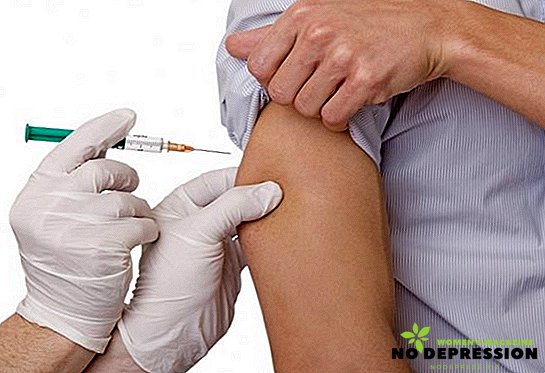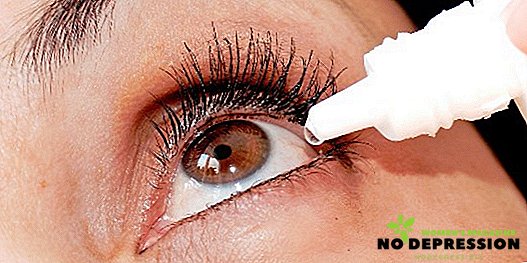Tick-borne encephalitis is a viral nervous system disease. The main source is taiga and European mite. After his bite, serious complications can occur, including loss of vision. To prevent such a problem will help vaccination against tick-borne encephalitis. But so that after it there are no side effects and complications, it is very important to follow all the recommendations of doctors.

Indications and contraindications
Similar vaccinations are given to both adults and children. Vaccination produces in humans a strong immunity to the disease, minimizes the risk of infection in case of contact with the carrier. Vaccination is the best and most reliable prevention.
Moreover, it is important to remember that such a disease can be transmitted through the bite of the parasite, and when eating infected foods.
Encephalitis is a dangerous pathology, which in the absence of quality and timely treatment can cause serious complications and even death. However, some health problems may occur after vaccination. Because it is so important to know what side effects may occur.
After all, often vaccination in the presence of contraindications may cause serious complications. Contraindications include:
 epilepsy;
epilepsy;- tuberculosis;
- problems of the cardiovascular system;
- rheumatism;
- infectious kidney disease;
- blood disorders;
- systemic inflammatory connective tissue disorders;
- malfunctions in the endocrine system;
- crayfish;
- allergy.
In addition, contraindications include the tendency of a person to stroke, a chronic form of coronary disease, liver disease.
You can also not be vaccinated in the following cases:
- at elevated temperatures;
- during pregnancy and lactation;
- after viral hepatitis, viral infection.
The drug should not be administered to women who have given birth less than 4 weeks ago; it is also not administered to children under the age of 1 year. The only exception is when there is a high risk of infecting a child.
When taking certain medications, you should also not administer the vaccine, as this may cause an adverse reaction. Because it is so important to inform the doctor about taking medication.
Vaccination is desirable to do in the following cases:
- relocation or business trip to an endemic region (humid climate, many forests);
- spring or summer, since it is during such periods that insects pose the greatest danger;
- during constant travels through forests and fields (especially hunters and fishermen);
- when working in a conservation area, on farms, etc.
Moreover, vaccination should be carried out a month before the intended trip. Try not to neglect the vaccine, because it will strengthen the immune system and help to avoid serious pathologies and even save lives.
Vaccination schedule
For the production of the required amount of antibodies, it is necessary to make three vaccinations at different intervals (this applies to vaccination of adults and children). The break depends on the recommendations of the manufacturer and the chosen treatment regimen.
Standard
 When using domestic drugs, the scheme looks like: 0-1 (3) -12.
When using domestic drugs, the scheme looks like: 0-1 (3) -12.
Thus, the second vaccination is done one or three months after the first, a year later the last one is done. When using imported drugs, the scheme is slightly different: 1-0 (7) -9 (12). That is, the second vaccine is made 7 or 9 months after the first, and the third after a year.
Once every three years, so that the body remains under protection, revaccination is carried out.
Emergency
It is carried out exclusively under strict medical supervision. The interval between drug administration is two weeks for the formation of the immune system.
To vaccinate children, you can use any scheme. It will be much safer and safer if at least two weeks elapse before the intended visit to the "danger zone" from the moment of vaccination.
What can be adverse reactions
Vaccination can cause a number of side effects, which are divided into two conditional groups:
- Local Manifest almost immediately after visiting the doctor. This is usually an allergy, in which a rash appears, lymph nodes are enlarged.
- Are common. Headache, malaise, muscle and bone pain may occur.
After the injection may appear:
- nausea;
- fever;
- fever;
- headache;
- muscle aches;
- weakness.

In severe cases (quite rare), mental abnormalities, blurred vision may appear.
In order to avoid serious complications when these symptoms appear, remember the following:
- Do not hide your health from the doctor;
- vaccination should be carried out only in a healthy state;
- the preparation used for injection must have a quality certificate (you can ask the doctor to indicate it).
It is believed that imported goods are much better quality than Russian ones. However, the difference between them is small.
Often the cause of adverse reactions is incorrect administration of the drug. So, the vaccine should put a specialist. A nonprofessional may inadvertently touch a nerve or vessel when injected.
Put a vaccination in the shoulder. With the wrong introduction of the drug may appear soreness, hematoma, swelling.
The average cost of vaccination is from 1300 rubles.
Complications after vaccination
Failure to follow the rules for vaccination may cause serious complications. Knowing the consequences, many refuse vaccinations. However, in this case, you need to be aware of the full degree of risk that is present when a tick bites.
After immunization, complications such as:
- Quincke edema, if a person has an allergic reaction to the components of the drug;
- vascular pathology;
- malfunctions of the cardiovascular system.
Most often, such problems appear if a person agrees to conduct the procedure without having previously studied the contraindications.

How to minimize the risk of complications
To ensure that vaccination is successful and safe, you should first consult with your doctor and, if necessary, pass tests. This is especially necessary for those who have any chronic diseases. So you can minimize the risk of side effects and complications.
If there is a high probability of an allergic reaction, you should take an antiallergic drug in advance, and to prevent heat and muscle pain, you should use drugs with antipyretic effect.
Both children and adults develop almost identical adverse reactions. That is why the vaccination of children must adhere to all the above rules and recommendations. And for children, the use of anti-allergic and anti-inflammatory drugs before and after vaccination is mandatory.
Good health, compliance with all the recommendations of the doctor and the use of appropriate medications will minimize the risk of complications and side effects.


 epilepsy;
epilepsy;









